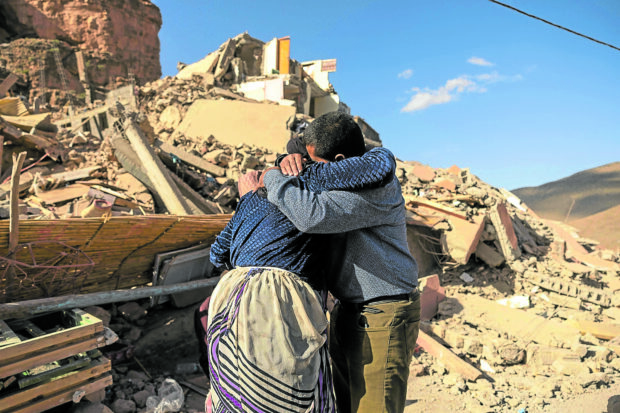
TRAGEDY Family members console each other near the rubble of collapsed buildings in the village of Imi N’Tala near Amizmiz in central Morocco after a deadly magnitude 6.8 earthquake hit the country last week. —AFP
As rescuers race against time to find survivors in the aftermath of a magnitude 6.8 earthquake that hit Morocco last week, the Department of Foreign Affairs (DFA) said Filipinos working and living in the North African country were staying put as no one had requested repatriation as of Monday.
Speaking at the Laging Handa public briefing, DFA Assistant Secretary for Migrant Workers Affairs Paul Cortes said that of the estimated 4,600 Filipinos in Morocco, around 50 are in Marrakech, a tourist destination which is among the areas worst affected by the earthquake.
It has been more than 48 hours after what is considered Morocco’s deadliest earthquake in more than six decades, a disaster that devastated villages in the High Atlas Mountains.
“Good for us, luckily, there are no reports of our countrymen having injured or becoming a casualty in this earthquake,” Cortes said.
“They [decided] to stay put and they are still working and, you know, going on. Life goes for the majority of them,” he added, noting that most Filipinos in Morocco are domestics and blue-collar workers.
The Philippine Embassy in Morocco, citing data as of Sept. 11 from the Moroccan Interior Ministry, said that 2,497 people died from the earthquake while 2,476 were injured.
“As of the moment, the embassy has received no reports of any Filipino being affected by the earthquake. It is in touch with leaders and coordinators in various areas of Morocco,” it said in a statement.
Cortes said Filipinos needing assistance should contact the Philippine Embassy in the Moroccan capital Rabat through email or social media.
On Monday, the Philippines also conveyed its solidarity with Morocco.
“On behalf of the [Philippine] government, I wish to express our solidarity with Morocco in light of the devastating earthquake yesterday. Our thoughts and prayers are with the families of the victims of this tragedy,” said Foreign Secretary Enrique Manalo in a post on X (formerly Twitter).
Lethal
A Reuters report said many survivors spent a third night outside, their homes destroyed or rendered unsafe by one of Morocco’s most powerful earthquakes.
With many homes built of mud bricks and timber or cement and breeze blocks, structures crumbled easily. It was the North African country’s most lethal earthquake since 1960 when a major tremor was estimated to have killed at least 12,000 people.
In the village of Tafeghaghte, Hamid ben Henna described how his 8-year-old son died under the rubble after he had gone to fetch a knife from the kitchen as the family was having their evening meal. The rest of the family survived.
People have been salvaging possessions from the ruins of their homes and describing desperate scenes as they dug with their bare hands to find relatives.
The damage done to Morocco’s cultural heritage has been emerging gradually.
Buildings in Marrakech old city, a World Heritage Site, were damaged. The quake also reportedly did major damage to the historically significant 12th-century Tinmel Mosque in a remote mountain area closer to the epicenter.
Survivors struggling to find shelter and supplies have voiced criticism of what they have described as an initially slow government response.
Morocco has deployed the army as part of its response and has said it is reinforcing search-and-rescue teams, providing drinking water, and distributing food, tents, and blankets.
State television reported on Sunday the government might accept relief offers from other countries and will work to coordinate them if needed.
Search-and-rescue specialists with sniffer dogs have been sent by Britain and Spain. For its part, Qatar said its search-and-rescue team departed for Morocco. Spain said it received an official request for aid from Morocco on Sunday.
France, among the countries offering assistance, said on Sunday it stood ready to help and was awaiting a formal request from Morocco.
King Mohammed VI thanked Spain, Qatar, the UK and United Arab Emirates for sending aid, state TV reported on Sunday. Morocco had assessed aid needs and considered the importance of coordinating relief efforts before accepting their help, it added.
—WITH A REPORT FROM REUTERS INQ
READ: Morocco quake death toll now at 2,681; no Filipino fatalities recorded so far — envoy